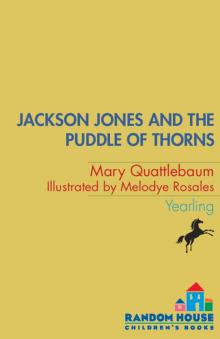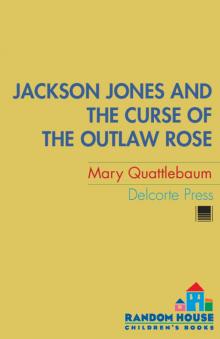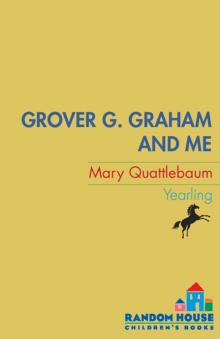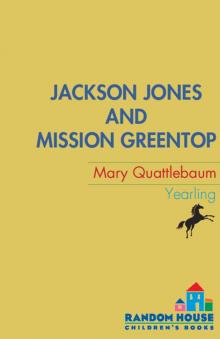- Home
- Mary Quattlebaum
Grover G. Graham and Me Page 4
Grover G. Graham and Me Read online
Page 4
You an expert? I remembered Tracey Graham’s sneer.
I glanced at the name of the author. Dr. Benjamin Spock. Doctor. That would make him an expert, right?
I read the back cover. The book was enlarged, revised, updated. And only twenty-five cents. Sure, it was old, but how much could babies have changed? From all I’ve seen on TV, the basics stay the same. Babies poop, cry, eat, mess with stuff they shouldn’t. I figured I could give the book to Mrs. T. to give to Tracey. It might help more than those classes.
Chapter Eight
After dinner I headed to Jake’s room with my library book, but Grover toddled after me so fast I figured, why not read together? So I settled on the living room couch with Where Eagles Dare and handed Hop on Pop to the kid.
The first thing he did? Put it in his mouth.
“Grover”—I shook my head—“that’s no way to treat fine literature.”
He thumped the book. “Ga-ba-da!” One of his pudgy paws hooked under a page. Riiiiip.
“Grover, no!” I grabbed the book.
Grover reading on his own was definitely not working. Hop on Pop was checked out on my library card. Guess who’d be paying when it was trashed?
I lifted the kid and set him beside me.
“Ga,” he demanded, scratching the cover.
But I took control. I held Hop on Pop and started to read, nice and slow. Grover kept jabbing my side, so I tucked him on my lap. He settled right down then, all cozy, with that Tweety Bird head bobbing an inch from my nose.
“Ba!” Grover pointed to a picture of two little banshees dancing on their dad. “Ba! Ba!” I could tell he was trying to say something, but how do you translate ba?
I took a stab. “Bear,” I said. “One little bear. Two little bears.”
“Ba!” Grover’s fat little feet beat my knees.
That’s how it went the entire book. I’d never taken so long to read so few words in my life. I could have read three chapters of Where Eagles Dare in the time it took to creep-crawl over those sixty-four pages, mixed with a million bas.
When we finally reached the end, “Ba,” Grover commanded, pounding the book. “Ba!”
So I read that book again. And again. Midway through the fourth reading Kate and Jango wandered through and settled beside us.
“Please start over,” they whined. “We want to see all the pictures.”
So I started over. After all, that bossy Kate had actually said “please”—maybe for the first time in her life.
By the time old Charmaine lumbered in, I swear, that book was engraved on my brain.
“Ba!” Grover squirmed off the couch.
“Ba!” He grabbed both Charmaine’s ears.
The dog shot me this pitiful look. I figured I owed her one.
I thought that was the end of Hop on Pop. Jeesh, was I ever wrong. The next evening after dinner, Grover ba-ed like a demented sheep. I brought one of his chewed-on board books to the couch, but he flat-out rejected it. I’d read one sentence and the kid would be turning the page, peering under the book, crying, “Ba.” It was no use. I was stuck with Hop on Pop.
After two more nights of this, I started to worry. Why did Grover need to hear the same story over and over? Maybe he couldn’t get it fixed right in his head. Maybe he was stupid. Maybe he’d have to take special classes. The other kids would call him names. Slow Grover. Grover the Goob.
People would be mean to him.
Finally I worked myself up to asking Mrs. T. if she thought something was wrong.
She was wiping a sponge over the kitchen faucet but immediately stopped and turned. “Why?”
What could I say? I wanted to tell her—but I didn’t. Grown-ups usually make a problem worse. What if she started taking Grover to doctors and shrinks? Or to a home for retarded kids?
So I fixed on the faucet, shiny and silver.
“I can tell you’re worried, Ben.”
I glanced at her sharply. How could she tell? I wasn’t exactly a blabber. In fact, with the Torgles, I kept talk to two topics: meals and chores. Mrs. T. was tied up with the twins and Grover. I didn’t need her to watch over me.
But her words showed she had been watching.
I didn’t like that. I felt like a camouflage fish thrown up on the beach. Exposed. Nowhere to hide.
I made my face go blank. Fixed on the curtains above the sink. They were pea green with scrawny tassels. Gram’s curtains had been checked blue and white. Like teeny squares of sky and stars.
The tassels drooped. Here I was, squealing again. It was getting to be a habit.
“Grover’s obsessed with Hop on Pop,” I finally got out. “He wants to hear it again and again. Something must be wrong with him.”
“Oh.” Mrs. T. clapped her hand to her mouth.
Horrified, I guessed.
She made a choking sound.
Laughing. The woman was laughing.
“That’s just what little kids do,” she finally said, wiping her eyes. “When they like something, once is never enough.”
I could feel the flush move up my neck. What a fool!
“Grover is just like my Jake. Poor Mr. Torgle got stuck with Madeline in the very same way.” Mrs. T. chuckled. “One night I caught him talking in his sleep—repeating the same words over and over.” Mrs. T. droned in a deep voice like her husband’s: “‘Twelve little girls in two straight lines.’
“And you know what, Ben?” Mrs. T. switched back to her regular voice. “For years Jake liked to line things up, from the peas on his plate to the pencils on his desk. Just like those little girls.” She laughed again.
Well, who would have guessed? Some book called Madeline and Saint Jake Jock? Maybe he had even lined up his trophies. I pictured the big blond guy nudging a gold batter here, a quarterback there, getting the little guys in perfect rows.
“Well,” I said with relief, “Grover’s not that obsessed.”
Mrs. T. grinned. Then she reached out and kind of rumpled my hair. I remembered Gram’s tapping and Mrs. Crawdich’s smoothing, but Mrs. T. had a different style. Her fingers turned like a somersault. When she stopped, I could still feel her hand, its warm weight.
Mrs. T. returned to her cleaning. “I don’t think you need to worry about Grover. He’s sharp as they come. His mother—” Mrs. T. stopped short.
Grover’s mother. Pouty lips. Black spider lashes. She’d canceled her visit today.
“What’s wrong with Tracey?” I asked.
“She’s got the flu.”
I shook my head. “I mean really wrong.”
Mrs. T. frowned slightly. She seemed to frown whenever I asked about Tracey. “She’s … pulling herself together. She’s doing her best.”
Right. Her best didn’t seem too good. I remembered Grover crying over that cheap present, all wrong for a baby. I remembered him reaching for me.
Mrs. T. angled the sponge at the edge of the sink, then straightened it. She said, “You think about Grover a lot, don’t you, Ben?”
That question could have come straight from the mouth of my nosey social worker. Right down to the “Ben.” Suddenly I was alert.
“Maybe more than you think about yourself?” asked Mrs. T.
I shrugged. Why should I think about myself? I was doing just fine, thank you very much. I carefully straightened my hair where the woman had messed with it. Mrs. T.’s shrink strategies were as obvious as Ms. Burkell’s, I thought. She needed to turn her eyes in Grover’s direction. That mother of his needed watching.
What had Tracey done to lose Grover, anyway? I remembered kids I’d known in the system. Banged up and bruised by their parents.
Had Tracey hurt Grover? I needed to find out, in case the kid ever needed help.
It was time for a chat with the snoops.
Chapter Nine
In two days, I saw my chance.
Grover had just gone down for a nap and I could escape. Lately the kid had taken to following me like a goat after grass. Swish, swis
h, swish. I swear that sound even entered my dreams.
Kate and Jango were playing under the sweetgum. At its best, this was one pitiful tree, but today it looked downright goofy. Christmas tinsel draped a few gumballs, and two Barbies, tied up with string, spun slowly from a branch.
And the tree wasn’t the only thing dressed silly. It was sweat-sticky hot—and those girls had scarves around their necks and colored tights on their heads. “We’re princesses,” Kate informed me.
“You look like rabbits,” I said.
Beneath the tree, Charmaine scratched at the fake holly on her collar. Red ribbons drooped from her ears.
Kate gestured proudly: “Our noble steed.”
I tried to keep my eyes from rolling. I reminded myself I was doing this for Grover. “Do you want me to, uh … play or something?” I asked. My plan was to work in a few questions when they least suspected.
“You want to play?” Jango’s eyes opened wide. “With us?”
Maybe this wasn’t such a good idea.
“You’ve got to play right, Ben,” Kate said, “or you’re out. What do you want to be?”
Jeesh, I didn’t know. I’d never played pretend with other kids, just by myself.
I answered Kate: “Maybe I can be king.”
Kate shook her head firmly. “Our father is the king.”
Jango stubbed at the scrawny grass. “Kate says he’s on crusade.”
“He is on crusade,” Kate shot back.
In the time I’d been at the Torgles’, the twins’ dad hadn’t bothered to call or write. On crusade. Right.
“He’s gone,” muttered Jango.
“Ben!” Kate yelled, as if trying to drown out Jango’s words. “You could be a fairy like the Barbies—”
“No,” I said firmly. “How about a prince?”
Kate giggled. “Then Princess Lenora has to kiss you.”
Jango turned all shades of pink.
“Why?” I asked. I wasn’t sure I could stomach a kiss from a seven-year-old—even to help Grover.
“Why?” Kate repeated. “Because … that’s what the king commands.”
Jango’s face went as red as the tights on her head, but she still didn’t say a word. Do this, do that: Kate bossed and Jango obeyed. If Kate wanted to wear pink, they both wore pink. If Kate wanted to watch TV, they both watched TV. If Kate spun a fairy tale about her deadbeat dad, Jango had to spin, too. Kate the Great needed to hear a few nos.
I pointed to the noble steed, who was gently panting. “Charmaine is the only one allowed to kiss me.”
This time it was Jango who giggled.
“Oh, all right,” Kate humphed. She peeled four strands of tinsel from the tree, decorated my shoulders, then stepped back.
“A knight in shining armor,” she pronounced.
Luckily, a knight didn’t have to do much but stand with the scratching steed. Around me, the twins prepared a feast for the absent king. Well, actually, Kate plucked the greenest grass—rare as gold in this pitiful yard—while Jango fingered a leaf here, a brown blade there, but added nothing to the dishrag Kate called “the Royal Plate.”
Casually I dropped my first question: “Do you think Tracey will visit soon?”
Kate instantly stopped her grand preparations. “Why?” She batted her lashes. “Do you like her?”
I shrugged. “Just thought you might know something”—I coolly brushed at my tinsel—“but obviously you don’t.”
Of course, Kate couldn’t miss an opportunity to show off her teeny bit of knowledge. It took a while to untangle the twins’ story, filled with more gaps than Grover’s grin. You could tell the girls had put together the whole tale from eavesdropping on the Torgles. To hear them tell it, Tracey had just up and left one day. Disappeared, leaving Grover behind while her boyfriend slept. He didn’t know what to do with Grover because the baby wasn’t his. (The twins got confused here but I knew what was going on. The guy wasn’t Grover’s real father and couldn’t be bothered with him.) Tracey’s older sister, Jenny, worked during the day and went to college at night. And so Grover had been thrown to the system.
I remembered how I got started in the system. It was the morning Gram fell. I remembered hearing the crash and running into the kitchen. Gram was lying beside a tipped-over chair. “I can’t, Ben,” she whispered when I tried to help her get up. Her poor hands scrabbled at the floor. “Oh, Jesus, I can’t.” That scared me. Gram was never one to toss around the Lord’s name. I brought her a towel, wet and folded, just like she asked, and she pressed it to her face. I brought her the phone and she dialed 911. When the ambulance came and they loaded her up, Gram grabbed tight hold of my hands. “I’ll be gone a little while,” she promised, “and come back good as new.”
I smelled Ben-gay, warm and sharp, on my hands when I lifted them to my eyes.
Things after that are all mixed up. I’m not sure what happened when. A woman—a social worker, I learned later—put me in the backseat of a blue car. I was worried about Gram’s false teeth, still in their night cup. How would Gram eat? How would she smile? But the car moved very fast. It took me to a cluttered office with green walls. I waited while the woman wrote on the blank lines of many pieces of paper. Then I was taken to a house. Someone made me a sandwich. Peanut butter. But it wasn’t Jif.
Gram died the next day. The social worker came to the strange house and told me. She used easy words—“broken hip,” “very old,” “lots of pain”—but I didn’t understand, not then. Not till the funeral.
The social worker held my hand the whole time, but I wasn’t scared. I felt I was watching everything from far away. There was Gram, still and quiet inside that big box. That was strange. She had always been one to sniffle and snuffle and snore through the night. She looked nice, though, with her white hair smooth, not all wispy. I heard the preacher dropping his words, one by one, into the church silence. When he started thanking the Lord for Gram’s long life, for her eighty-two good years on Earth, I almost fell over. Eighty-two! Gram was old. She had no business standing on that kitchen chair, I thought. I looked at her hands, bent with arthritis, while the social worker’s, slim and warm, grasped my own. Whatever Gram had wanted, whatever she needed from the highest shelf, I wished she had asked. I would have fetched it for her.
After the funeral the system tried to trace my mother. Nothing. They had no record of my father. The woman told me Gram’s will left me to the care of a friend, who’d gone into a nursing home that spring. So the system sent me to my first foster home. Number One, a transition home. Short stay, you’re on your way. To Number Two.
The Crawdiches had thought about adoption before I arrived. I was on trial—and failed. Too many time-outs in the closet. By the time I left, I was six years old. Quiet and serious. Not an easy kid to find a home for. Most folks want a bouncing baby.
And Grover was that kind of baby. He had more bounce than a bucket of balls. Now he was at his own Number One with the Torgles. Who knew what would happen to him next? If his mother had stayed away, I bet he would have been adopted right off. Any grown-up would go gaga over him. Would love pinching his cheeks and playing piggy-wiggy with his toes. Would love showing off his picture in a big, fancy frame.
But his mother had returned. Returned and wanted him back.
That might seem like something to celebrate—unless you knew a few mothers who’d lost their kids to the system. Drinkers, most of them. Quick to yell and slap and wallop with a belt. Quick to walk out on their kids, just like Tracey.
Kate broke into my thoughts. “Tracey’s pulling herself together, that’s what Mrs. T. says. She’s living with her sister.”
“She’s doing her best,” said Jango.
Right. A girl like that was bound to disappear again, drink, do drugs, laze away any job she might land.
And Grover would be stuck with her—or back in the system. What kind of life was that?
I cleared my throat for one last question, something I’d wondered about for
a while. “The G in Grover G. Graham—what does it stand for?”
Kate pondered the question. “Gumball,” she giggled.
What a ditz.
I’d found out all I needed to know, but I continued playing knight for a while. It was almost fun, once I knew what to do. Basically I bowed when Jango curtsied (which thankfully wasn’t too often) and watched while Kate twirled and thumped through what she called “The King’s Welcome Dance.” Pitiful. All for a man on permanent crusade. When Kate finally finished, I let myself clap loud and long for her.
After dinner, Ms. Burkell called. She was sorry, but the Number Nine they had lined up—a wonderful young couple—hadn’t worked out. I pictured the bounce-bounce-bounce of her hair beads. “I know these temporary arrangements are hard, Ben. I promise, we’ll have you settled soon.”
A young couple. Maybe they were as kissy as Kitty and Ken. At least with the Torgles I wasn’t worried about interrupting anything. At their age, they were all kissed out.
Ms. Burkell cleared her throat. She was working up to some “meaningful contact.”
“Would you like us to try to trace your mother again? It’s been five—”
“No.”
“It’s a chance for a home with a relative.”
“No.”
“Are you afraid she might disappear again?”
Ms. Burkell was trying to get into my head. I knew how to handle that. Just keep saying no.
Sarah Jewel had never called, never written. She didn’t even know Gram was dead.
Snooping can get you in big trouble, that’s what I kept telling the twins. I’d take my own advice, thank you very much. Sarah Jewel wanted to forget she had a kid. Fine. I wouldn’t give her a reason to remember.
I thought about Grover. About Tracey beaming in and out of his life like some fairy god-awful mother. Ms. Burkell might want to spin a sweet tale about Sarah Jewel’s return, the kind Kate spun about her dad, but I would refuse to listen.
Ms. Burkell sighed. “I’ll find you a new place soon.”
As I hung up I wondered exactly how much time “temporary” included. Three weeks, four weeks, six? My shortest stay had been five weeks with Number One. So far I’d been four weeks with the Torgles.

 Jackson Jones and the Puddle of Thorns
Jackson Jones and the Puddle of Thorns Jackson Jones and the Curse of the Outlaw Rose
Jackson Jones and the Curse of the Outlaw Rose Grover G. Graham and Me
Grover G. Graham and Me Jackson Jones and Mission Greentop
Jackson Jones and Mission Greentop